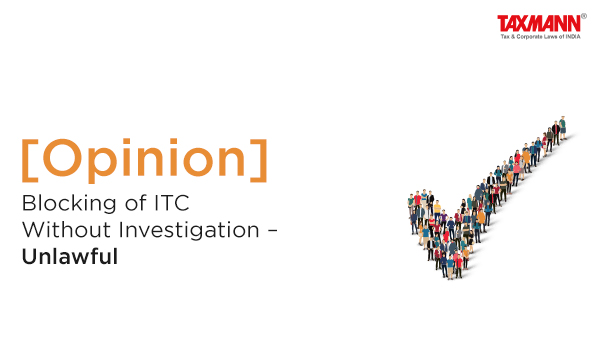[Opinion] Blocking of ITC Without Investigation – Unlawful
- Blog|News|GST & Customs|
- 3 Min Read
- By Taxmann
- |
- Last Updated on 23 September, 2023

Mahi Yadav – [2023] 154 taxmann.com 408 (Article)
Abstract
The introduction of the Goods and Services Tax (hereinafter referred as “GST“) regime, implemented in India in 2017, marked a significant reform in the country’s taxation system. One of the key components of this reform is the Input Tax Credit (ITC) mechanism, which allows businesses to offset the tax paid on inputs against the tax liability on outputs, thereby reducing the overall tax burden. However, recent instances of blocking ITC without proper investigation have raised concerns about the legality and fairness of such actions. This article aims to analyse the meaning of Input Tax, eligibility and condition of taking ITC along with legal implications of blocking ITC without investigation.
Understanding Input Tax Credit (ITC)
Before delving into the legal aspects, it is essential to grasp the concept of ITC under The Central Goods & Services Tax Act, 2017 (hereinafter referred as “CGST“) which defines Input Tax under Section 2(62) which states that “input tax” in relation to a registered person, means the central tax, State tax, integrated tax or Union territory tax charged on any supply of goods or services or both made to receipt him and includes
(a) The integrated goods and services tax charged on import of goods;
(b) The tax payable under the provisions of sub-sections (3) and (4) of section 9;
(c) The tax payable under the provisions of sub-sections (3) and (4) of section 5 of the Integrated Goods and Services Tax Act (hereinafter referred as “IGST“);
(d) The tax payable under the provisions of sub-sections (3) and (4) of section 9 of the respective State Goods and Services Tax Ac; or
(e) The tax payable under the provisions of sub-sections (3) and (4) of section 7 of the Union Territory Goods and Services Tax Act, but does not include the tax paid under the composition levy.
According to Section 16 of the CGST Act, 2017, which deals with the-
- Eligibility for ITC: A registered person is eligible to claim ITC on the goods or services received by them, which are used or intended to be used for business purposes.
- Conditions for claiming ITC: The following conditions must be met to claim ITC:
(a) Possession of tax invoice or debit note: The registered person must possess a valid tax invoice or debit note issued by the supplier.
(b) Receipt of goods or services: The registered person must have received the goods or services.
(c) Payment of tax: The tax due on such goods or services must have been paid to the government by the supplier.
(d) Furnishing of return: The registered person must have furnished the required GST returns.
- Time limit for claiming ITC: The ITC can be claimed by the recipient in their electronic credit ledger within the due date of furnishing the return for the month of September following the end of the financial year to which the invoice pertains or the date of filing the annual return, whichever is earlier.
As per Rule 37 of CGST Rules, 2017 which states the provision regarding Reversal of ITC, if the recipient fails to pay the supplier within 180 days from the date of issue of the invoice, the ITC claimed earlier will be added to their output tax liability along with interest.
Click Here To Read The Full Article
Disclaimer: The content/information published on the website is only for general information of the user and shall not be construed as legal advice. While the Taxmann has exercised reasonable efforts to ensure the veracity of information/content published, Taxmann shall be under no liability in any manner whatsoever for incorrect information, if any.

Taxmann Publications has a dedicated in-house Research & Editorial Team. This team consists of a team of Chartered Accountants, Company Secretaries, and Lawyers. This team works under the guidance and supervision of editor-in-chief Mr Rakesh Bhargava.
The Research and Editorial Team is responsible for developing reliable and accurate content for the readers. The team follows the six-sigma approach to achieve the benchmark of zero error in its publications and research platforms. The team ensures that the following publication guidelines are thoroughly followed while developing the content:
- The statutory material is obtained only from the authorized and reliable sources
- All the latest developments in the judicial and legislative fields are covered
- Prepare the analytical write-ups on current, controversial, and important issues to help the readers to understand the concept and its implications
- Every content published by Taxmann is complete, accurate and lucid
- All evidence-based statements are supported with proper reference to Section, Circular No., Notification No. or citations
- The golden rules of grammar, style and consistency are thoroughly followed
- Font and size that’s easy to read and remain consistent across all imprint and digital publications are applied



 CA | CS | CMA
CA | CS | CMA
